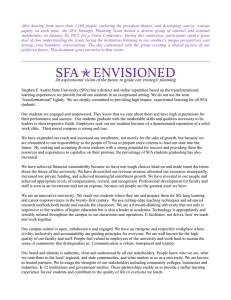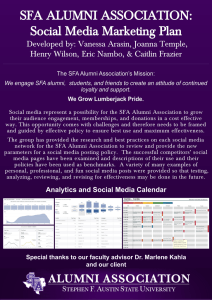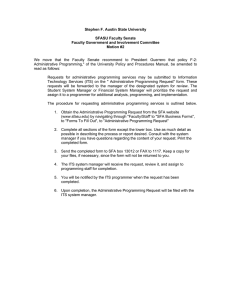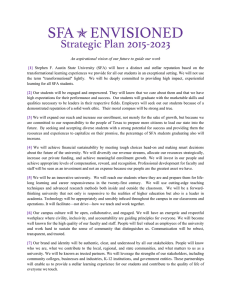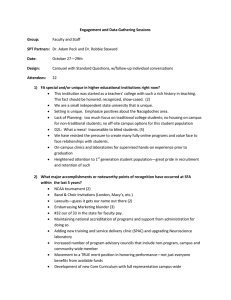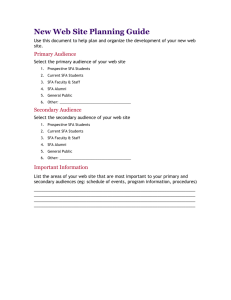Data Gathering
advertisement
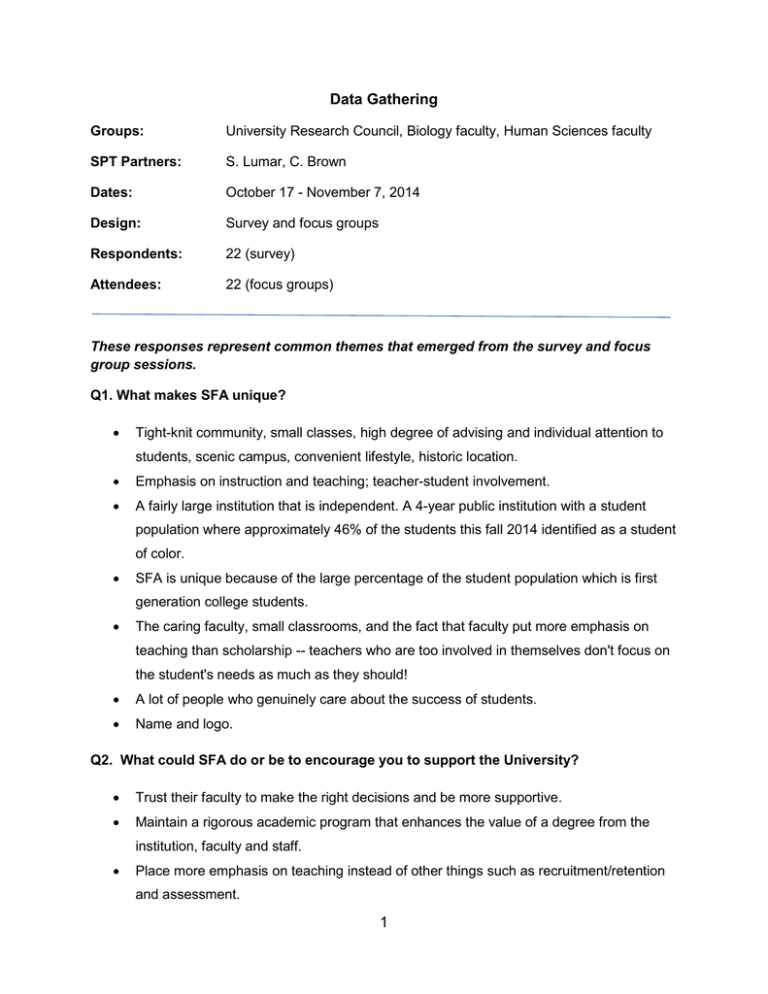
Data Gathering Groups: University Research Council, Biology faculty, Human Sciences faculty SPT Partners: S. Lumar, C. Brown Dates: October 17 - November 7, 2014 Design: Survey and focus groups Respondents: 22 (survey) Attendees: 22 (focus groups) These responses represent common themes that emerged from the survey and focus group sessions. Q1. What makes SFA unique? Tight-knit community, small classes, high degree of advising and individual attention to students, scenic campus, convenient lifestyle, historic location. Emphasis on instruction and teaching; teacher-student involvement. A fairly large institution that is independent. A 4-year public institution with a student population where approximately 46% of the students this fall 2014 identified as a student of color. SFA is unique because of the large percentage of the student population which is first generation college students. The caring faculty, small classrooms, and the fact that faculty put more emphasis on teaching than scholarship -- teachers who are too involved in themselves don't focus on the student's needs as much as they should! A lot of people who genuinely care about the success of students. Name and logo. Q2. What could SFA do or be to encourage you to support the University? Trust their faculty to make the right decisions and be more supportive. Maintain a rigorous academic program that enhances the value of a degree from the institution, faculty and staff. Place more emphasis on teaching instead of other things such as recruitment/retention and assessment. 1 Put into action the pay equity issue. Provide funds for faculty travel and faculty development. Need funds for undergraduate travel for in-state national meetings. Strengthen our rigor in research and put more money into our facilities and technology. Be more open with information; back up the "you are valuable" statements with resources. Increase compensation for faculty. Raise the admission standards to encourage higher quality students; focus on quality and not quantity. Q3. What is one innovative idea SFA should implement? Compensate faculty adequately. Using internal or local resources as much as possible. Treat faculty with the same care and concern as students. Review other institutions like Sam Houston State University and see what they are doing to consistently make the top ten of universities to work for. Allow two positions among the faculty-tenured and non-tenured positions, for faculty who want to conduct research or prefer 100% teaching. Support graduate education as a priority. Innovative, mobile labs to promote hands-on learning. Hold annual meetings with the dean per program to remain abreast of the issues within each program and disseminate information from the administrators. Merit pay should equal to the work demonstrated by faculty instead of pay differentials disseminated and determined by subjective perceptions/biases. Q4. What do students need to get from a college education/experience to be successful in life? Ability to think critically, work hard and work independently. The opportunity to try new things in a safe environment and to find their passion. Foundation of knowledge, problem solving skills, critical thinking skills, communication skills, opportunities for scholarly and creative contributions. SFA must offer a high quality education to students--doing so will work to attract the brightest students possible and likely lead to ensuring students are competitive in the local-regional-state-and-even global market. Students must access high-quality 2 teaching, up-to-date SFA facilities, strong leadership among faculty/staff, opportunities to study abroad, and critical mentoring/advising. A diversity of personal situations that allow them to grow as individuals. The acquisition of knowledge, skills, and abilities that will allow them to make a successful entry into their chosen profession. In order for students to be successful in life they should have the opportunity to complete multiple internships/work experiences during their college education rather than a single internship in their final year. Also, students should have the opportunity to participate in experiential learning activities which allow them to actually interact with course material rather than simply reading/talking about it. The most valuable experience for students is to have a relationship with their professors. Holding students to a high standard and teaching them how to improve their organizational skills, academic skills, social skills, etc. Q5. In what ways could support for faculty be demonstrated? Incentive rewards, creating a culture of caring for faculty and "internal guests", more perks that wouldn't cost much but would be appreciated, just to be treated with fairness, kindness and concern. More student-worker help for faculty, release time for administrative and research activities, increased salary. Offering a wider variety of opportunities to access internal funding to support research and creative projects. Access to the most-up-date technology in all classrooms and offices. Increase pay to illustrate value of faculty performance. Promote more diversity in teaching methods and recruitment and retention of faculty. Transparency in policies, ability to give feedback, financial support of activities that involve undergraduate and graduate research. Request faculty input prior to making decisions that impact faculty. Higher salaries, release time, more assistantships for teaching and especially for required duties outside of teaching (administrative tasks & university service such as 3 program coordination, assessment, recruitment & scheduling, development of articulation agreements). Salaries should reflect the value faculty members bring to the University based on merit instead of demographic factors, such as gender, which have nothing to do with the individual’s ability to perform and carry out the functions of the job! Utilizing the expertise, knowledge, and abilities in marketing the University. Deans, directors and program leaders should advocate for better working conditions instead of placing unrealistic performance expectations on faculty and expect them to perform with little to no increases in the resources need to perform the job more effectively and efficiently. Provide salaries instead of stipends to faculty who teach and do research during the summer months. Q6. In what ways could support for students be demonstrated? To encourage student travel to conferences and abroad, to have more faculty support for student activities. More faculty-student opportunities to interact outside the classroom. A stronger commitment to increasing the awareness and access to the most up-to-date technologies in all aspects through SFA (e.g., from classroom to classroom, building to building, dorm to dorm, etc; make technology a priority for this campus). Demonstrate making changes to support the faculty. Raise our standards; focus on quality NOT quantity. Let's support the faculty, who create awesome classes where students want to come to class and are getting the knowledge they need, who talk to their families and friends about how awesome their school/faculty/courses/majors are, and who become successfully employed after graduation. Do not set students up for failure. Improving learning environments and technological support will certainly show students they are valued. Additional scholarships, higher stipends, tuition assistance, and health insurance for graduate students. 4 Q7. What does SFA need to do to be competitive going forward? We need to decide if we are going to break out of the mold of a 4-year community college. Are we just here to "teach" or does teaching become integrated in serious practical learning experiences? Raise faculty salaries so we can retain and recruit better faculty. Highlight the diversity of programs, online options, and strong recruiting effort by the university recruitment office. Serious commitment to the following areas: --diversity (creation of a Vice President for Diversity and a concentration on integrating a wide range of diversity related programming at all levels of the institution) -- Support faculty so that they can focus on and spend more time on teaching/course delivery; some programs lack state-of-the-art facilities. Better website! Updated classrooms and technology. High Schools are getting to be much more advanced than Universities in regard to technology and classrooms. More funding, new blood, new innovators. SFA needs to be able to offer qualified professors a worthwhile benefit package that is not only attractive nationwide, but internally college to college. Gap in faculty pay scales from college to college. Increase the admission standards. Direct money into the academics. Stop pouring money into software programs for administrative purposes, administrative positions, and administrative offices. Play to our strengths - small classes, individual attention, faculty who care about the success of our students. Get more graduate assistantships to be more competitive with other universities' graduate programs. Graduate students bring in 4 times that of an undergraduate (at least used to) and the presence of graduate students attracts undergraduates. The more graduate students, the more research that can be done, the better our chances of getting external funding and better advertisement and recognition of SFASU. Texas funding of public institutions shapes these issues. Public announcements and statements on behalf of the faculty and programs. There is a movement to semiprivatization. There should be advocacy for funding changes and a message switch to focus on academics. 2-year residency requirement for undergraduates could discourage student enrollment. 5 Instead of redistributing funding between programs, there should be funding increases. Books need to be more affordable and accessible to students. Break the mold of being a teachers’ college. Q8. What have we not asked you that you would like to discuss? Improvements to graduate studies at SFA. Classes sizes in which the class sizes for a 4/4 course load range from 50+ to 80 students must be reevaluated at the college and department/program levels. For example, faculty who have such teaching loads are not teaching 4/4--but in actuality a 6/6 course load. This is bad practice when such faculty do not have graduate assistant support and are not being offered course overload as in additional pay for the additional responsibility for teaching what more reflects a 6/6 course load per year. Such practices may result in faculty becoming burnt out early, quickly, and often per semester. Ultimately, such practice undermines the opportunity to provide a quality education to students which in turn works negatively as students are then receiving a poorer education and are less inclined to access critical one-on-one mentoring and advising from knowledgeable faculty. Identify and clarify our focus professional identity as a University. Determine if we are a research intuition or a teaching institution. 6
